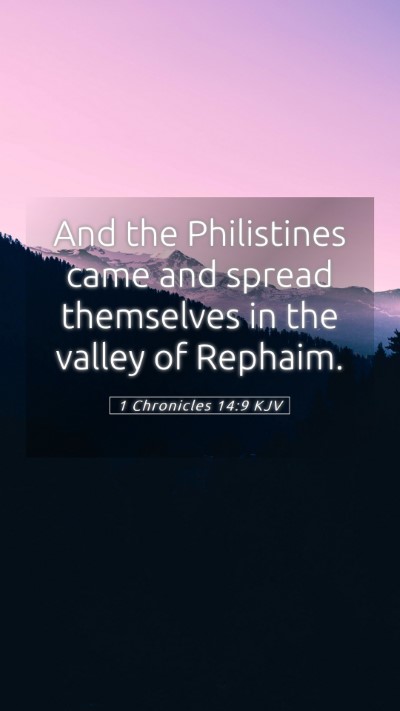Bible Verse Commentary on 1 Chronicles 14:9
The verse from 1 Chronicles 14:9 states, "And the Philistines came and spread themselves in the valley of Rephaim." This verse captures a critical moment in the narrative of King David's reign, where external threats prompt responses of faith and strategy. The insights from several public domain commentaries provide a comprehensive explanation of this scripture.
Understanding the Context
This passage occurs during a pivotal point in David's leadership, illustrating not only historical events but also the principles of faith, divine guidance, and human action.
-
Historical Context:
According to Matthew Henry, this event depicts the continual conflict between Israel and the Philistines, highlighting the Philistines as a persistent enemy during David’s ascension to power.
-
Symbolic Significance:
Albert Barnes suggests that the valley of Rephaim may symbolize a place of spiritual warfare, reflecting the ongoing struggle between good and evil.
-
Divine Intervention:
Adam Clarke discusses the implication of this verse as a setup for a demonstration of God's power, where David’s reliance on divine guidance is paramount for victory.
Bible Verse Interpretations
The phrase “spread themselves” indicates the readiness of the Philistines for battle, presenting the urgency and danger that David faced. This also serves as a reminder for modern believers about the necessity of preparedness in faith.
Key Themes in the Commentary
-
Faith in Adversity:
This passage teaches the importance of seeking God’s guidance amid adversity. Just as David consulted with God, believers are encouraged to approach challenges with prayer and trust in divine assistance.
-
Leadership and Responsibility:
The verse underscores the responsibilities of leadership, where David’s actions are critical not only for his kingdom but for the spiritual wellbeing of his people.
-
Victory through Divine Help:
The engagement in battle reflects the Christian belief that true victory comes from God. Commentators emphasize that our battles, be they literal or metaphorical, require faith and trust in the Almighty.
Applications of the Verse
In today’s context, 1 Chronicles 14:9 serves as a reminder that, while challenges may arise, maintaining faith and seeking God’s will is essential. Believers can draw parallels between David’s situation and their own lives as they navigate personal and spiritual struggles.
Practical Applications:
-
Bible Study Groups:
This verse can be a focal point for discussion in Bible study groups, helping members to explore themes of faith in adversity.
-
Bible Study Tools:
Utilizing commentaries, like those by Henry, Barnes, and Clarke, can enrich understanding and foster deeper discussion on the nature of warfare in a spiritual context.
-
Personal Reflection:
Individuals are encouraged to reflect on their life’s battles and how they can seek divine guidance in their struggles.
Bible Cross References
-
2 Samuel 5:17-25: Similarly discusses David’s battles with the Philistines, reflecting God's guidance and intervention.
-
1 Samuel 17: The story of David and Goliath showcases David's faith in the face of overwhelming odds.
-
Psalms 119:105: Highlights the importance of God’s Word as a guide amid trials and difficulties.
Conclusion
In summary, 1 Chronicles 14:9 serves not only as a historical reminder of David's challenges but also as an enduring lesson in faith, leadership, and dependence on God. The insights from various commentators illuminate the richness of this passage, providing both a historical and spiritual context that encourages ongoing reflection and application in modern life.
This analysis emphasizes the need for a robust understanding of Scripture through thorough study, enabling believers to harness the lessons of the past in their daily lives.


